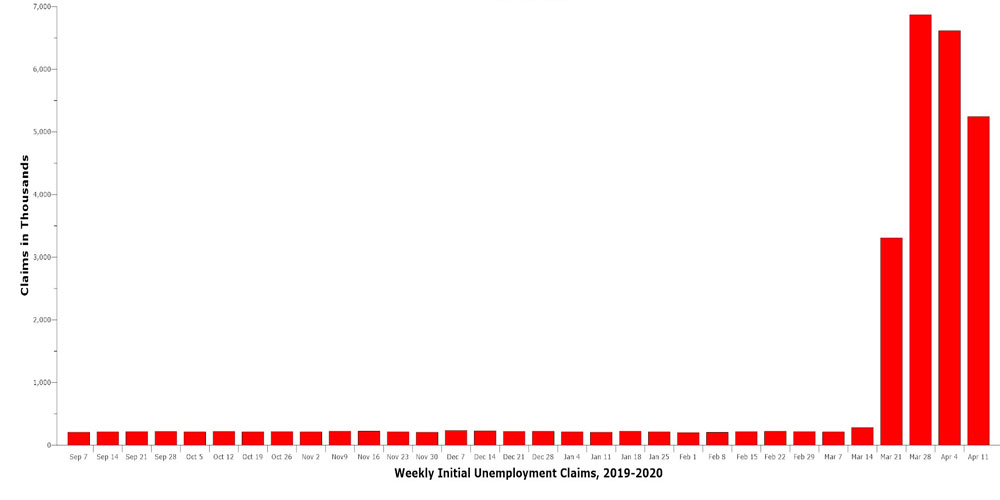
Just over 5.2 million Americans, including 181,300 Floridians, filed initial unemployment claims for the week ending April 11, bringing the total number of claims to over 22 million in the past four weeks as the coronavirus‘ economic crisis deepens.
In a civilian labor force of 162 million, that equates to an unemployment rate of at least 13.5 percent, a rate last seen in 1940, at the tail end of the Great Depression, when unemployment peaked at 25 percent in 1933. Economists expect unemployment claims to increase at a slower pace in coming weeks–but to increase nonetheless, pushing the expected unemployment rate closer to 20 percent. (From 1934 to 1940, the unemployment rate ranged between 15 and 20 percent.)
The numbers are increasing pressure on elected officials at all levels to find ways to reopen parts of the economy. But public health officials are urging patience and caution as peak Covid-19 effects are not expected in Florida until the early days of May and an adhoc, uncoordinated reopening of segments of society could lead to a resurgence of coronavirus cases. Stephen Bickel, the medical director at the Flagler and Volusia health departments, warned of an incautious resumption of activities as he described the potential risks during a Palm Coast government town hall meeting Wednesday. And while Americans want to go back to work as restrictions are lifted, they are likely to be leerier to frequent retail, entertainment and hospitality venues, thus slowing any recovery.
In Florida, the last four weeks of claims totals 652,000 which, combined with 291,000 unemployed Floridians before the crisis–a five-decade low–approaches 1 million unemployed, in a state with a civilian labor force of 10.5 million. That places the state’s current unemployment rate at around 9 percent.
Flagler County’s economy had been continuing its solid recovery from the 2010 recession, adding close to 11,000 people holding jobs since then and seeing its labor force continuing to break records in the past year as it approached 48,000, with fewer than 2,000 people unemployed. If Flagler’s unemployment rate is proportionate to the state’s, the number of Flagler residents without jobs will have more than doubled, to 4,300, as of early April.
The figures are likely an undercount as the state’s unemployment compensation system has been struggling to cope with a combination of problems–a dysfunctional “Connect” online system, a lack of sufficient employees to handle new claims, and previous eligibility restrictions clashing with more generous standards under the public health emergency, among other issues.
The Connect system was revamped in 2013 at a cost of $77 million, but has been heavily criticized in audits since then. In the 2019 report, the Florida Auditor General cited 17 critical findings.
On Wednesday, Gov. Ron DeSantis took largely cosmetic moves to counter continuing complaints of dysfunction in the system as he pushed aside Department of Economic Opportunity Executive Director Ken Lawson, placing Department of Management Services Secretary Jonathan Satter in charge. Lawson was not fired. DeSantis, using a metaphor that did not seem to fit the issue, said he wanted to see Satter “rattle the cage.”
Relief checks approved by Congress began landing in Floridians’ bank accounts this week, but $600-a-week unemployment checks also approved by Congress have been slower to arrive. In a statement this morning, Secretary of Labor Eugene Scalia said “29 States are now paying the $600 weekly boost in unemployment benefits under the Act. The remaining States will begin providing the benefit as they update their systems.”
Florida reported fewer layoff in the agriculture, forestry, fishing, and hunting, construction, service, and manufacturing industries, but the tourism-dependent state continues to see employment losses in retail, the hospitality industry and related services. The economic consequences of the emergency have been visible in Flagler communities, with the weekend food distribution at Grace Community Food Pantry now drawing some 1,300 families, compared to 800 families in a typical weekend, and a county-organized food drop earlier this week serving some 400 households.
Flagler Cares on Wednesday announced the launch of a new a coordinated response system to assist Flagler County residents with needs emerging as a result of the public health emergency. Residents with immediate needs for assistance with food, rental navigation and understanding the unemployment application process can reach Care Connect+ Flagler County by calling 904-819-3094 or completing the Get Connected form at www.careconnectplus.com
Flagler Cares is currently building the Provider Network of organizations willing to partner on this initiative. Flagler County Government, United Way of Volusia-Flagler Counties, the Early Learning Coalition of Flagler and Volusia, the Department of Health in Flagler County and the Volusia Flagler County Coalition for the Homeless will all be partners. Other organizations interesting in partnering can contact Carrie Baird at [email protected].
![]()





























Nicholas P Rusiniak says
Hopefully you are creatively , vigorously, working on ways to open our county. It is easy to say no; more difficult to find ways to say yes. You cannot flip an on/ off switch but you need to start adjusting the dimmer.
For some reason you allow Hobby Lobby to stay open. So maybe you need to apply that logic to others.
You don’t want to be behind the curve.
Gary R says
Hobby Lobby has temporarily closed all stores due to the coronavirus https://www.usatoday.com/story/money/2020/04/03/coronavirus-closings-hobby-lobby-temporarily-closing-all-stores-covid-19/2943408001/
Flatsflyer says
Hopefully Hobby Lobby, Chick-afucker and Amway all go out of business along with Trump’s hotels and resorts!